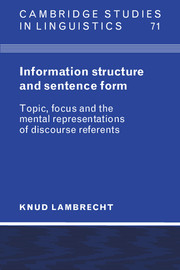 Information Structure and Sentence Form
Information Structure and Sentence Form Published online by Cambridge University Press: 05 June 2012
In this and the next three chapters I will analyze the concepts which I consider fundamental to the study of information structure. These concepts are: (i) propositional information and its two components presupposition and assertion (Chapter 2); (ii) the identifiability and activation states of the representations of discourse referents in the minds of the speech participants (Chapter 3); (iii) the pragmatic relations topic (Chapter 4) and focus (Chapter 5). Many of the observations in these chapters have been made by other linguists before me, and I will acknowledge my predecessors whenever possible. Other portions, I believe, contain new insights, such as the analysis of the pragmatic relations “topic” and “focus” and of the relationship between the two. In particular, what I believe is new in my treatment, and what prompts me to call it loosely a “theory,” is the idea that an account of information structure must include all three of the sets of concepts listed above and must explain how they relate to each other.
The universe of discourse
I will begin by sketching a simple model of the universe of discourse. In this model, I presuppose the primacy of spoken language over other forms of linguistic communication (see Lambrecht 1986b: Ch. 1). I will therefore always refer to “speakers” and “hearers” (or “addressees”) not to “writers” and “readers.”
To save this book to your Kindle, first ensure no-reply@cambridge.org is added to your Approved Personal Document E-mail List under your Personal Document Settings on the Manage Your Content and Devices page of your Amazon account. Then enter the ‘name’ part of your Kindle email address below. Find out more about saving to your Kindle.
Note you can select to save to either the @free.kindle.com or @kindle.com variations. ‘@free.kindle.com’ emails are free but can only be saved to your device when it is connected to wi-fi. ‘@kindle.com’ emails can be delivered even when you are not connected to wi-fi, but note that service fees apply.
Find out more about the Kindle Personal Document Service.
To save content items to your account, please confirm that you agree to abide by our usage policies. If this is the first time you use this feature, you will be asked to authorise Cambridge Core to connect with your account. Find out more about saving content to Dropbox.
To save content items to your account, please confirm that you agree to abide by our usage policies. If this is the first time you use this feature, you will be asked to authorise Cambridge Core to connect with your account. Find out more about saving content to Google Drive.